The keto diet is a relatively popular way of eating. There are a variety of interesting statistics, trends, and facts about this diet.
Below you can find a short list of some of the most popular findings about this low-carb diet and after that even more interesting statistics, trends, and facts and where these come from.
Keep in mind that the figures below are often estimations from smaller studies, surveys, and search engines. These things generally come with a lot of biases, suboptimal sample selection, and measurement errors. In reality, the numbers will likely vary for the overall population, sometimes by a lot.
Quick overview of popular keto diet statistics
To start you can find a few of the most popular ketogenic diet statistics, facts, trends, and estimations implied from the investigated data in a quick overview.
- Surveys suggest about 4%-5% of Americans and Canadians are following the keto diet.
- Compared to 2016, the number of searches of the term “keto foods” was 1807.69% higher in 2019.
- Compared to 2019, the number of searches of the term “keto diet” was down 64.95% in 2021.
- Losing weight is generally the most popular reason for going on a keto diet.
- 5% of the participants of one survey looked into the keto diet because a celebrity or show influenced them.
- One source estimates that the worldwide ketogenic diet market size was 10221.40 million USD in 2019.
- January 5th is generally considered National Keto Day.
- In a survey, the main reason people say they quit keto is generally that the diet feels too strict.
In the rest of this article you can find more interesting statistics about this diet and where these numbers come from.
1. Number of individuals on keto
Finding out the number of individuals that follow a keto diet is challenging but there are some statistics available to get a better idea.
In the 2021 Food & Health Survey from the International Food Information Council, they asked 1014 Americans ages 18 to 80 whether they had followed any specific eating pattern or diet at any time in the past year.
Just under 5% of the participants answered that they had followed a ketogenic or high-fat diet (1). Some of these individuals will already have quit the keto diet at the time of answering.
This is less than the 2020 survey from the same organization. In that version, about 8% of the 1011 respondents said they had tried a ketogenic or high-fat diet in the past year (2).
One poll with 1502 Canadians in January 2020 from Dalhousie University asked participants a variety of keto-related questions. 4% of the participants were following a keto diet (3).
So the most recent polls in 2022 imply that about 4% – 5% of the American and Canadian participants were following a keto diet. The statistics for the rest of the world are less clear.
2. Keto diet search trends
The keto diet seems to be a diet that is gaining more and more popularity. A question is if this also motivates more people to search for keto-related search terms that indicate that people try this diet out more.
Google Trends is a tool that shows you how much interest in certain search terms evolves over time for the given region and time. A value of 100 is the peak popularity for the term. A value of 50 means that the term is half as popular.
We added up the months to get “searches” (relative differences) per year, compared a few keto-related search terms worldwide, and found some of the following trends:
- Searches for the term “keto diet” only started gaining steam in 2011.
- Compared to 2017, the number of searches of the term “keto diet” was up 200% in 2019.
- Compared to 2019, the number of searches of the term “keto diet” was down 64.95% in 2021.
- The number of worldwide searches of the term “keto recipes” was highest in 2019, more specifically in the month of January. In 2021, the number of searches for this term was only 53.5% of the 2019 total. Comparing January of each year, only 67%.
- Compared to 2016, the number of searches of the term “keto foods” was 1807.69% higher in 2019. In the years after that, keto terms in general took a hit.
Part of these numbers is due to other reasons like the popularity of Google and their tracking.
Even so, these numbers indicate that the number of searches on google for keto-related search terms only really started from 2011 and grew very fast until 2019.
After that, potentially due to the lockdowns, keto-related search terms have definitely been losing popularity.
This first graph shows the relative interest in search terms like “keto recipes”, “keto snacks”, “keto breakfast”, “keto meals”, and “keto foods”.
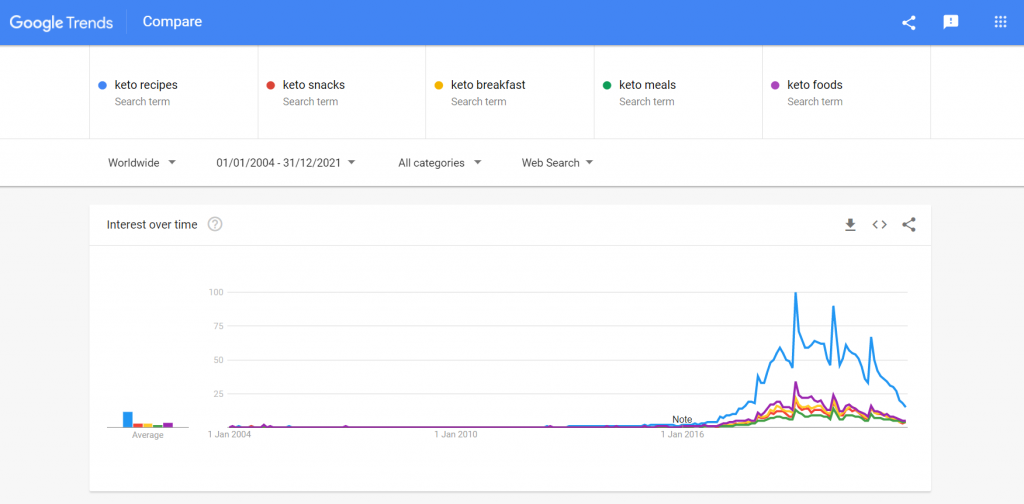
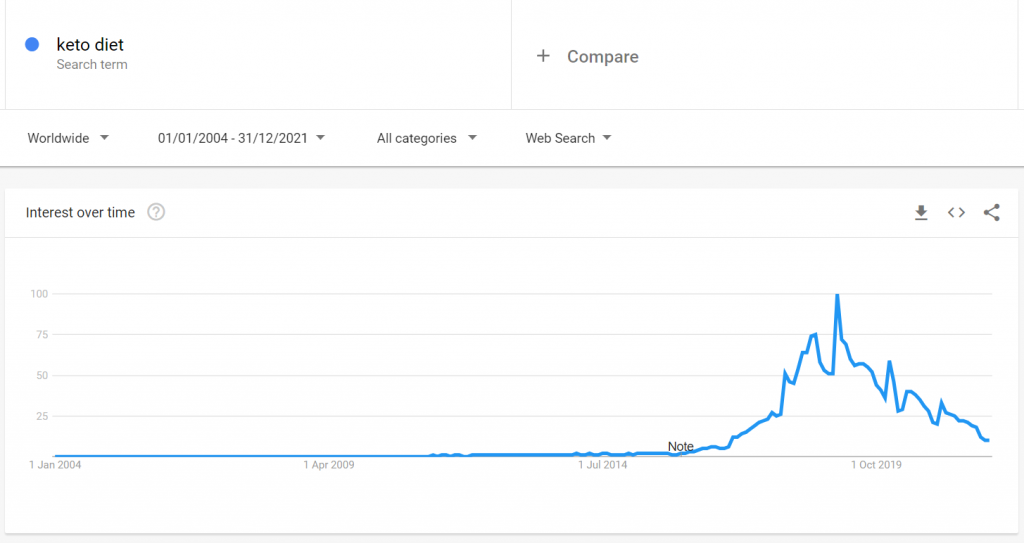
3. Why do people go keto?
Two people can follow the same eating habits of the ketogenic diet but they can do this for different reasons. Unfortunately, the data about this is not from surveys with the highest number of participants and in turn not that precise. Even so, there are a few interesting statistics.
One poll with 1502 Canadians in January 2020 from Dalhousie University asked participants a variety of keto-related questions. 4% of the participants were following a keto diet. These people were then asked what motivated them to start the keto diet.
69% of these people went keto to lose weight, 48% were concerned with overall health and wellbeing, 15% started a keto diet because a friend recommended it, and 5% looked into the keto diet because a celebrity or show influenced them (3).
Additionally, when comparing the interest in search relative to each other of terms related to the potential benefits of keto the main motivation is clear.

4. Keto diet popularity vs other diets
The ketogenic diet is by far not the only type of diet. There are a wide variety of other options for goals like losing weight, improving health, avoiding animals as a food source, and more.
The 2021 Food & Health Survey from the International Food Information Council with 1014 Americans ages 18 to 80 also asked the participants about other diets. Some of the most popular diets included (1):
- 10% tried calorie counting
- 9% clean eating,
- 8% intermittent fasting
- 6% low-carb diets
- 5% ketogenic or high-fat diet
- 5% flexitarian diets
- 5% plant-based diets
- 5% carb-cycling
- 4% Mediterranean diets
- 4% gluten-free diets
- etc.
Below you can find a worldwide search volume comparison from 2004-2021 between the “keto diet”, “calorie counting”, “clean eating”, “intermittent fasting”, and “vegetarian”.
As you can see the vegetarian diet is generally more popular than the keto diet when it comes to the number of searches. With all the examples you have to keep in mind that searching for and following diets are different things.
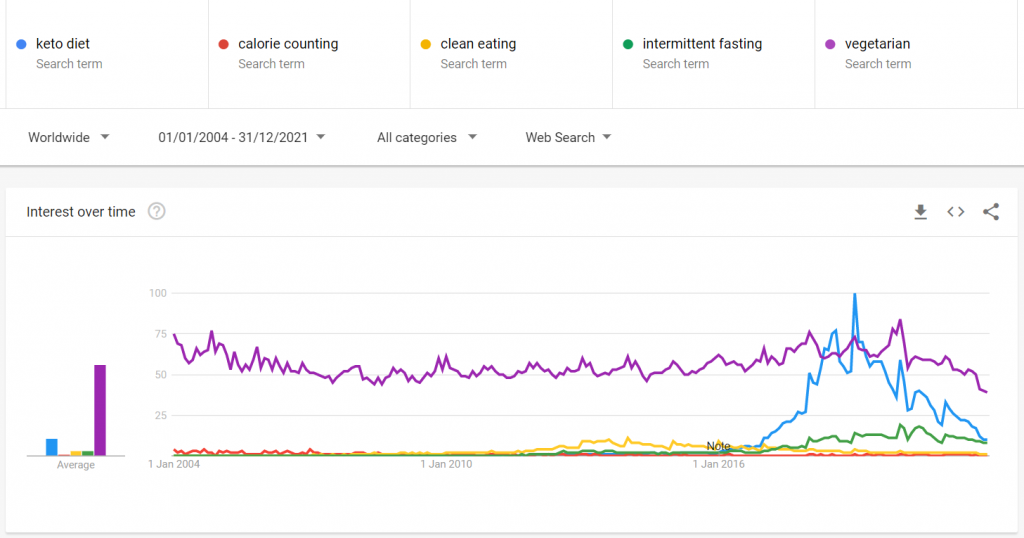
5. Common keto nutrient deficiencies and insufficiencies
While many people experience benefits from the ketogenic diet, it is also important to talk about the possible downsides.
Removing carbohydrates from your diet in the amounts needed to stay in ketosis also means consuming less of certain nutrients that are known to be important for good health.
Some examples of common nutrient deficiencies and/or insufficiencies on the ketogenic diet include magnesium, folate, vitamin C, potassium, sodium, calcium, and selenium (4).
Additionally, you want to pay attention to consuming enough fiber.
Something else to keep in mind is that it is not yet known what the ideal human diet is, what specific nutrients you need in what amounts.
Removing carbohydrates to the extent of a ketogenic diet for extended periods of time can have effects that are not yet understood.
On top of that, there are many genetic differences that again influence what diet is the best for you personally.
6. At least 7 different types of keto diets
In its essence, the keto diet comes down to keeping your carbohydrate intake low enough so your body primarily uses fuel from other sources.
There are however a variety of types of keto diets that implement extra rules on top of that. Some of these diets include:
- Strict keto: As the name implies, this version does not allow a lot of carbs. In strict keto, about 90% of daily calories come from fat, 6% from protein, and 4%. This version is not for most people but is used to treat certain conditions.
- Lazy keto: You only track your carbohydrate intake.
- Mediterranean keto: A ketogenic diet that focuses on eating enough healthy fats from sources like olive oil and fatty fish.
- Dirty keto: A ketogenic diet where you only focus on staying within your macronutrients. This often means a lot of processed foods.
- Clean keto: This version focuses on whole foods. That means preferably no artificial preservatives and for example grass-fed beef instead of regular beef.
- Vegetarian keto: As the name implies this version combines the vegetarian (no animal meat) and keto diet. This version is challenging to do in a healthy way.
- Vegan keto: This version takes it one step further and also excludes cheese and eggs. This is even more challenging to do in a healthy way.
Additionally, there are also diets or eating patterns that sometimes implement keto or just reduce carbohydrate intake but are technically not full-time ketogenic diets. Some of these include:
- Cyclical keto diet: Switching periods of keto with off-days. One example is 5 days of keto and 2 days off.
- Targeted keto diet: This version is done by active individuals and implements certain amounts of carbohydrates around workouts, generally before.
These are some of the most common types of the keto diet. Inevitably some people will have their own specific versions of the diet.
7. Keto market size
While not always necessary, there are a variety of keto products on the market to help you. Examples include supplements, vitamins, beverages, snacks, minerals, MCT oil, etc.
One source estimates that the worldwide ketogenic diet market size was 10221.40 million USD in 2019 (5).
8. Carb substitutes
Carb substitutes are a category of foods and food products that try to replace the taste, texture, and/or nutrients from meat.
With the increased popularity of the keto diet and the health benefits of reducing intake of refined carbohydrates, these products tend to be more and more popular and available.
Some of the most popular ones include keto bread, keto ice cream, keto desserts in general, keto cheesecake, keto pancakes, keto pizza, keto cookies, and keto cereal.
Below you can also find another Google Trends graph that compares how much the search terms “keto bread”, “keto ice cream”, “keto cheesecake”, “keto pancakes”, and “keto pizza” get searched worldwide over time compared to each other.
After that, there is a similar graph that shows the trend of people searching “cauliflower rice”, a popular low-carb food swap, worldwide and over time.


9. How many people have tried the keto diet
Even if they don’t stick to it, a good amount of people have still given the ketogenic diet a try.
One poll with 1502 Canadians in January 2020 from Dalhousie University asked participants a variety of keto-related questions.
4% of the participants were following a keto diet and another 9% of the participants had tried and dropped the diet (3).
On January 5th, 2022 we even conducted a quick 24-hour poll on our own Instagram page with the question “Have you ever tried a keto diet?” that could be answered with “Yes” or “No”.
100 people responded to this poll. 25% of these people answered yes, 75% of these people answered no.
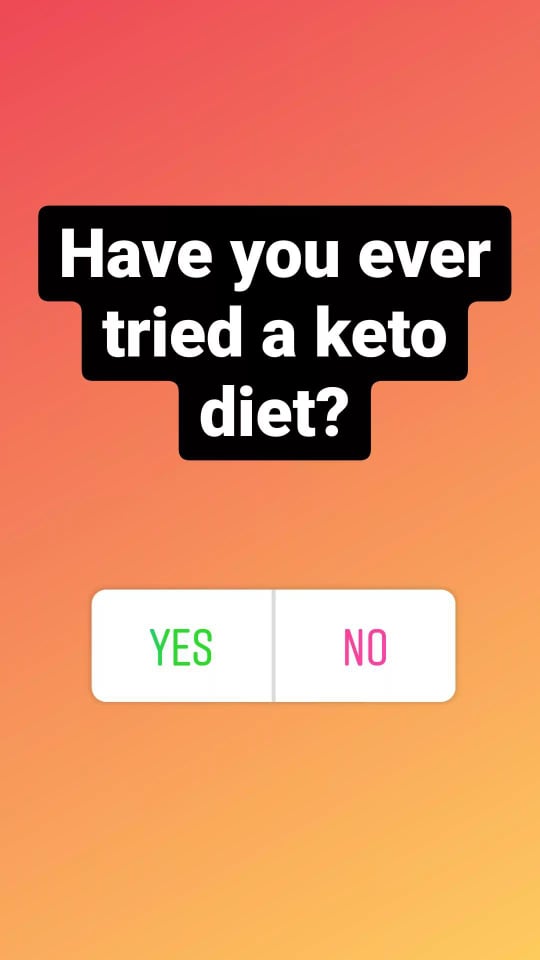

10. Number of books about keto
Another interesting statistic about keto is the number of books on the subject. To investigate this we went to one of the biggest bookstores in the world, the website Amazon.
This website offers an advanced search option where you can filter the search results among other things by release date.
We looked at how many book search results there were with the keyword “keto” with a release date before a variety of years. A downside is that for big numbers the numbers get rounded down.
Additionally, there are inevitably many other reasons why this data is not perfect. Even so, it still offers an interesting look at how much the number of books about keto has gone up.
There were only 365 book results with a publish date before 2000. This went up to 909 keto book results with publish date before 2009.
After that, things start really taking off up to more than sixty thousand keto book results with a publish date before 2021.
Below you can find the results we found in a graph and a screenshot of where we got these numbers.


11. How many people are open to the keto diet
The current number of people on a keto diet is decent but there are also a good amount of people who are considering this way of eating.
Again, the number and quality of the statistics available on this subject are not the best but interesting to see anyways.
One poll with 1502 Canadians in January 2020 from Dalhousie University asked participants a variety of keto-related questions.
In this poll, 10% of the participants said they were thinking about following the keto diet (3). 4% of the participants were already following this way of eating.
This may not sound like much at first but if these results are representative of the general population, that means that 1 in 10 people is considering the keto diet.
Similar to the “Have you ever tried the keto diet” statistic, we also conducted a quick 24-hour poll on our Instagram page on the fifth of January 2022 with the question “Will you try/continue a keto diet in 2022” that could be answered with “Yes” or “No”.
89 people responded to this poll. 23.6% of these people answered yes, 76.4% of these people answered no.
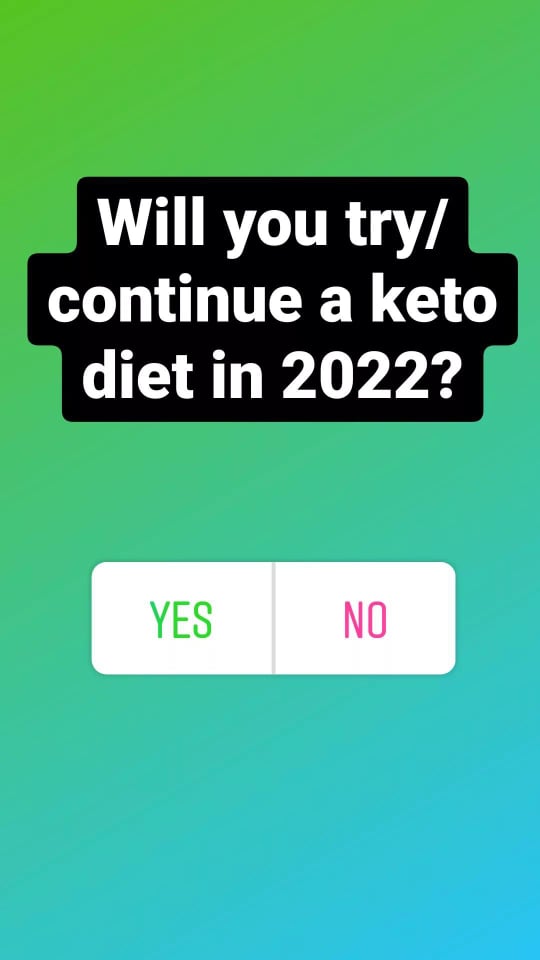

12. Keto meal delivery trends
Some challenges people encounter on the ketogenic diet include that they don’t find the time to make keto-friendly meals and/or find the keto diet slightly confusing in terms of what you can eat.
Both of these challenges can be overcome with keto meal deliveries. These are basically services that prepare your keto-friendly meals or deliver the ingredients in the right amounts.
Below you can find how often people search for keto meal delivery versus other types of meal delivery from 2015-2021. As you can see keto meal deliveries are relatively popular.

13. Days to celebrate keto
While people usually start the keto diet with the goal of sticking to it at least for a while, there is a day on which the ketogenic diet gets extra attention. January 5th is generally considered National Keto Day.
For most people switching to a ketogenic diet for one day will not be enough to get in the state of ketosis, using ketones (the fuel from fat) as their main source of energy.
Even so, you use this day to get started with the ketogenic diet, try out some keto-friendly recipes, reduce your carb intake a small amount, or celebrate in any other way.
14. How long do people stick to keto
Some people question the sustainability of the keto diet. Others claim it is a diet that is easy to stick to once you are used to it. In reality, the success rate will likely be somewhere in between.
In any case, there are some statistics that try to give a better impression of how long people stick to a keto diet. This is an important factor for any weight loss diet plan.
The Dalhousie University poll in January 2020 with 1502 Canadians again offers some data on the subject. They asked the 4% of the participants who were following a keto diet how long they had been on a keto diet.
24% of these participants said they just started, 42% said they started less than a year ago, 32% said between one and five years, and only 2% said they were on a keto diet for more than five years (3).
This last number sounds and is not much but keep in mind that the keto diet only slowly started gaining traction in 2011.

There are also groups of keto enthusiasts on the popular social media site Facebook. This same question has been asked in some of these with a good amount of respondents.
As you can see from the difference in results this is likely not the most representative for all individuals on the keto diet but interesting nonetheless (differences could also be due to seasonality and other causes).
Keto poll 1 results
(July 9, 2018, 257 responses)
- Just starting: 42.8%
- 2-4 weeks: 5.1%
- 1-3 months: 34.2%
- 3-6 months: 13.2%
- 6 months or longer: 4.7%
Keto poll 2 results
(September 17, 2018, 474 responses)
- First week: 7.8%
- 2-4 weeks: 21.1%
- 1-3 months: 46%
- 3-6 months: 19.2%
- 6 months or longer: 5.9%
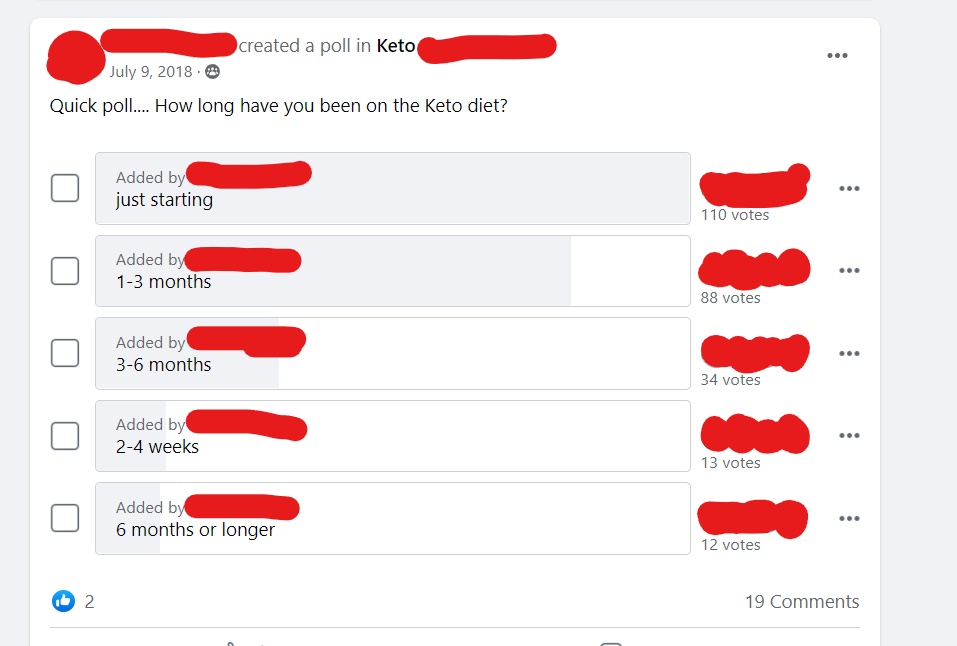

15. Why do people quit keto
Some people don’t like to admit it but following a keto diet also comes with challenges. Not that many people stick to keto and there are a few reasons for this.
The Dalhousie University poll in January 2020 with 1502 Canadians again offers some data on the subject. They asked the 9% of the participants who had tried and dropped the diet why they quit.
37% of the participants said they quit because the regime was too strict, 34% said keto was too costly, 24% said they did not have enough time, 12% said they did not see any results, and 10% found the diet too confusing (3).
This is not a whole lot of data but if you are looking to get started with keto, these statistics can help you avoid common pitfalls.
